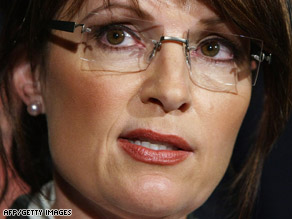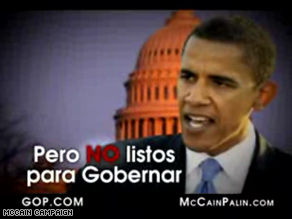
Both McCain and Obama addressed the
burgeoning economic crisis on the Trail yesterday. They'll be returning
to that theme for the next 50 days. (Getty Images)
The crisis that has seized Wall Street over the last few days caught the campaigns of both Barack Obama and John McCain flat-footed.
Neither man, as we wrote yesterday,
has a demonstrated expertise on the issue and national polling shows
that voters aren't sure whether Obama or McCain would do a better job
in managing the economy as president.
So, with both campaigns scrambling to win the issue over the next
few days, The Fix solicited the opinions of a handful of Republican and
Democratic strategists, asking them what specifically they would advise
their party's candidate to do in the short term to stake their claim to
this critical issue.
We collected and sorted the suggestions -- which ranged from the
zany to the downright ingenious. We picked the best five for each
candidate and listed them below; some contradict one another but all
seem to have solid strategic thinking behind them. The names behind the
suggestions have been withheld in order to let the operatives speak
their minds without being seen as telling their party's candidates (and
his inner circle) what to do or not do.
Agree or disagree? The comments section awaits.
OBAMA
1. Two-Day Ohio Tour: Obama should spend two full
days traveling the Buckeye State with stops in cities ranging from the
big (Cleveland) to the medium (Dayton) to the small (Zanesville). The
suggested theme? "McCain's strong fundamentals" playing off of the Arizona senator's much-disputed statement Monday
that the fundamentals of the economy are strong. Ohio was the central
battleground of the 2004 election and the economic stresses have
hammered the state in the intervening four years. Show Ohioans Obama
isn't just a gifted speaker; he understand better than McCain the
problems faced by average middle class families.
2. Spend a Night At Home:
With home foreclosures still a huge problem and many middle class
families worried about being able to make their monthly mortgage
payments, Obama should spend a night at home with a family facing
potential foreclosure -- either in Nevada or Michigan, two of the
battlegroundiest (is that a word) states in the country. This idea is
along the lines of the Service Employees International Union's "Walk a Day in their Shoes" campaign during the Democratic primaries but has the potential to produce great television images that ooze "empathy."
3. A Series of Speeches: Obama's greatest strength
is his oratorical abilities. Use them. Follow the blueprint used to
much success by George W. Bush in 2004 when he gave a series of
speeches explaining and contextualizing the war in Iraq and the fight
against terrorism. Use that framework and sub in the economy; in one
speech tackle the pinch the economic crisis is putting on an average
middle class family, in another lay out how small business are being
impacted, in a third show -- specifically -- how an Obama
Administration would handle the economic problems different than has
the current president. "Speeches are his wheelhouse and he needs to get
back into his comfort zone," said Phil Singer, a former adviser to Hillary Rodham Clinton's presidential campaign. "He's been trying to be someone else which has been cramping his style on the stump."
4. Town Hall Tryout: Obama has largely avoided the
sort of town halls that McCain has made his own during this campaign.
Pick a series of white working class neighborhoods and set up a series
of economic-themed town halls over multiple days. Do more listening
than talking. Obama, as The Fix himself has witnessed during a
presidential dialogue sponsored by MTV and MySpace in Iowa,
tends to shy away a bit from the "I feel your pain" politics of Bill
Clinton. Suck it up and wade into the crowd. Console people who are
struggling, hug folks having hard times. Be, at least for a few days,
the consoler in chief.
5.Sitdown with Lehman Brothers Staff: Don't meet
with the bigwigs and suits of the failed investment bank. Convene a
roundtable with some of the support staff (administrative assistants
etc.) who are impacted by the company veering into bankruptcy. Almost
no one feels bad for the executives when these massive companies go
through crises, knowing that these well-paid upper management types
will survive without a hitch. But, there are also large numbers of
employees at Lehman and other companies who are living paycheck to
paycheck and will have their lives fundamentally altered by the
bankruptcy. Put faces to these statistics and let them speak their
minds about what's wrong and how to fix it.
MCCAIN
1. Seek Out Regional Banks: The big banks of the
United States are struggling badly. Highlight the idea that great ideas
can come from the states by meeting one on one with a as many
successful managers of regional banks as the McCain can find. (A side
benefit of this idea: it reminds voters that McCain has a governor not
a senator as his running mate.) Frame the meetings as a chance for
McCain to hear what's wrong with Washington -- and New York City --
from people out in the country. Embrace the cultural divide many people
perceive between Washington/New York and the rest of the country.
2. Listening Tour of Michigan, Ohio and Pennsylvania:
Like her or hate her, it's hard to argue that Clinton's 2000 listening
tour throughout Upstate New York was anything less than a brilliant
political tactic. It put her in front of hundreds of voters, allowing
her to show an empathetic side and debunk the idea that she had horns
and a tail. McCain, hamstrung somewhat by his past comments about the
economy, could do the same with a multi-day, multi-state listening tour
focused on the Rust Belt where the problems with the economy have cut
the deepest.
3. Give a Speech, Name a Treasury Secretary: Pick a
hotbed of deep economic thinking -- one Republican operative suggested
the University of Chicago -- and lay out the argument for how to reform
the economy in a way that is consistent with the principles of the free
market. In that speech, name the man (or woman) that would be his pick
for treasury secretary while also offering a vote of confidence for
Henry Paulson and insisting that he would be a valued adviser (along
with other economic big-brains including some Democrats) in a McCain
Administration.
4. Palin (Speaking) Power: Palin is a a huge draw
these days on the campaign trail. Use that popularity and her populist
appeal to speak to middle and lower middle class voters in a swing
state somewhere in the Midwest. One Republican strategist suggested a
speech by Palin on tax cuts -- strong territory for the GOP -- in
Wisconsin, a huge snowmobiling/snowmaching state where she has high
name ID and obvious appeal. Use the speech to paint the Obama economic
plan as a risk the country just can't afford given the state of the
economy.
5. Elevate Economic Gurus: While former Sen. Phil Gramm (he of the "nation of whiners"
comment) is probably off the board, McCain has a stable of respected
economic voices -- from former CEOs Meg Whitman and Carly Fiorina to
two-time presidential candidate Steve Forbes and former vice
presidential candidate Jack Kemp. McCain needs to flood the zone (with
apologies to Howell Raines) with smart voices testifying to his ability
to reform the economy and laying out the basic principles of the sort
of change -- and, importantly, break from the Bush economic policy --
that he would offer.






